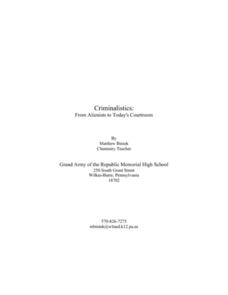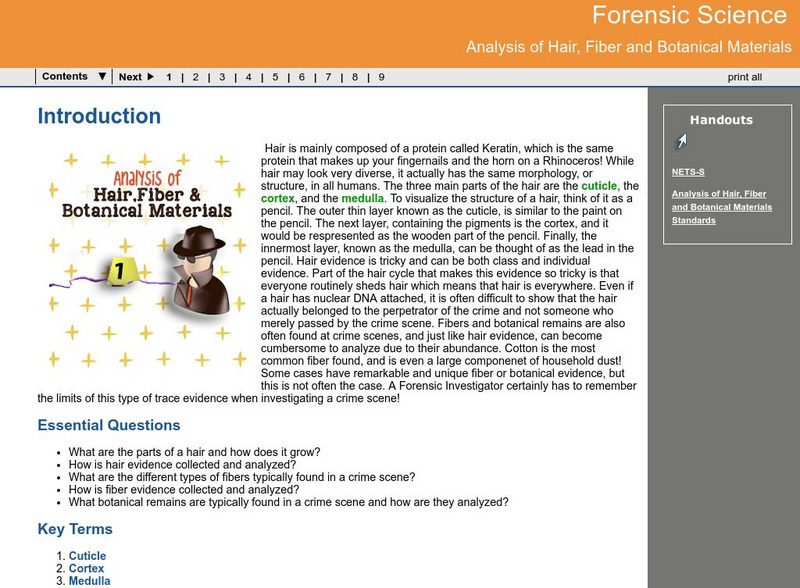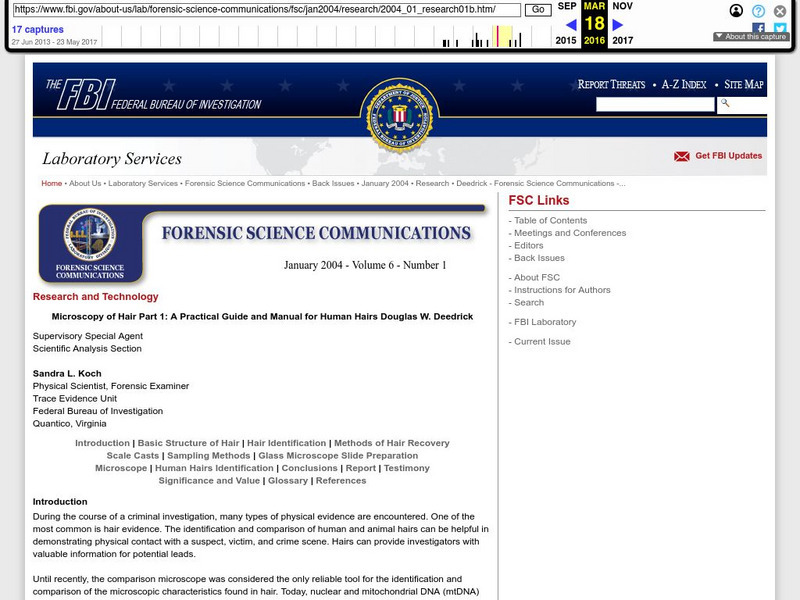Manitoba Education and Early Childhood Learning
Forensic Sciences: A Crime Scene Investigation Unit
Mr. Bergman has been murdered and we need you to solve the crime! The cross-curricular unit covers 11 different types of forensic science and includes 17 activities. Scholars perform blood type analysis, blood spatter analysis, height...
Curated OER
Hair Test
In this forensic science worksheet, students answer 3 open response questions about hair evidence collected from the crime scene.
Curated OER
Hair Test
In this forensic science worksheet, students write an open response to 3 short answer questions on hair evidence collected at the crime scene.
Curated OER
Hair Test
In this forensic science worksheet, students write an essay about 3 open response questions presented about hair evidence shown on the photo.
Curated OER
Hair Test
In this forensic science instructional activity, high schoolers write an open response to 1 question on hair evidence photo taken from the crime scene.
Curated OER
Mission Possible
Students, in teams, solve a crime using forensic lab techniques. They apply lab techniques to a real life situation using a crime scenario that takes place on campus. Sample activities include Blood, Fiber, and Hair Lab.
Curated OER
Physical Evidence
In this forensics worksheet, students complete 14 short answer questions related to physical evidence. They explain how certain types of evidence are handled upon recovery from the crime scene.
Curated OER
Who Did It?
Students explore how forensic science is used in criminal investigations. They learn that for the next few days that are going to try to solve a crime that took place in the classroom. Students are given a story to read about the crime...
Cornell University
Plant Cell Crime Scene
Use science to solve the mystery of the Poplar murder. Pupils use forensic botany to determine if a suspect could be the killer. By analyzing images from a Transmission Electron Microscope, learners determine if the material found on the...
Curated OER
Science: Criminalistics - A New Look at Crime
Students examine the world of forensic science, focusing on fingerprint analysis. In the lesson, they implement a method by which fingerprints of class members are categorized and identified. Elementary students study classification...
Curated OER
Arsenic Contamination: Water Filtration
Students work in groups to design a filtration process that will separate clean water from polluted water. They organize data in tables or graphs and present their findings to the class. Students identify further safety protocols that...
Curated OER
Dig Magazine Archeology Quiz #106
In this Dig Magazine archeology quiz, students answer 12 multiple choice questions complementing the October 2009 issue. Page contains answer and additional resources link.
Georgia Department of Education
Ga Virtual Learning: Forensic Science: Analysis of Hair, Fiber and Botanical Mtl
This comprehensive interactive tutorial explores forensic science, particularly within the area of hair analysis. Investigate the parts of a hair and how it grows. Learn how is hair evidence is collected and analyzed and what different...
Federal Bureau of Investigation
Federal Bureau of Investigation: Practical Guide for Human Hairs
The FBI gives a detailed analysis of the human hair including how to use it as forensic evidence. Topics covered are hair structure, identification, and methods of hair recovery. Labeled diagrams and electron photomicrographs enhance the...















